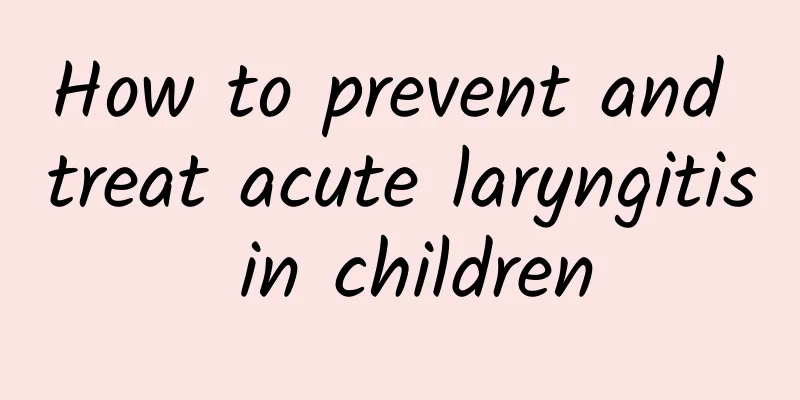What should I do if my newborn baby has pathological jaundice? 4 ways to prevent pathological jaundice

|
Neonatal jaundice is divided into physiological and pathological. Physiological jaundice will automatically fade away about 2-3 weeks after birth. But pathological jaundice is not so easy to treat. So what should we do with neonatal pathological jaundice? What to do if neonatal pathological jaundice There are four common conditions: hemolytic, which means excessive hemolysis; the second is hepatocellular, which is caused by hepatitis. The third is infectious, which includes sepsis. The fourth is biliary atresia. Biliary atresia occurs later. In the neonatal period, it is mainly caused by the first three types and congenital metabolic diseases. First, we should treat the cause, such as immune hemolysis, to control the hemolysis. For example, the most common one is G-6-pD deficiency in the south. This is more common. We should avoid using some drugs that cause hemolysis. Some children will hemolyze and cause jaundice when they come into contact with camphor balls. The second is the treatment of jaundice. It is caused by hemolysis, which is generally irradiated with blue light. The third is to promote its excretion, and the other is to promote the activity of liver enzymes. If it is caused by hepatitis, we should treat hepatitis, and there are factors of capillary bile duct obstruction. Biliary atresia occurs later and may appear after the neonatal period. How long will neonatal pathological jaundice last? ABO hemolysis occurs when the mother is O-type blood and the father is not O-type blood. When the child is not O-type blood, there is a 20% chance of it happening. The first baby is heavier. Due to the antigen-antibody reaction on the red blood cells, the red blood cells are destroyed, thus causing anemia, that is, a decrease in hemoglobin and red blood cells. The pathological jaundice caused by hemolysis will not recur after treatment. It takes at least 1 week to be cured, and the slowest one can be cured in 2-3 weeks. Most jaundice can be cured with timely treatment. However, severe pathological jaundice in newborns can affect the child's brain development, so timely treatment is the key. Prevention of pathological jaundice in newborns 1. Take good care of yourself during pregnancy and seek timely treatment if any abnormality is discovered to avoid fetal intrauterine hypoxia, suffocation, infection, etc. 2. Carefully take care of the newborn. Keep the newborn warm (room temperature should be kept constant at 24-27℃), keep the air fresh and well-circulated, and ventilate for 30 minutes each in the morning and afternoon. Keep the newborn's body temperature at 36.5-37.5℃. 3. Pay attention to hygiene: Babies have tender skin and poor resistance to infection. They should be bathed frequently and kept clean, paying special attention to skin wrinkles. Clean the umbilical crypt with an alcohol cotton swab every day. Underwear and diapers must be clean and soft, and disinfected regularly to avoid cross infection. After each bowel movement, wipe with a warm and wet towel and apply diaper cream or tannic acid ointment. 4. If pathological jaundice is suspected, the child should be sent to the hospital for diagnosis and treatment in time. |
Recommend
What is Hirschsprung's disease? Is it easy to treat?
Hirschsprung's disease is a congenital diseas...
Can tics heal themselves when they grow up?
Attention Deficit Hyperactivity Disorder (ADHD) r...
The fastest way to reduce swelling from mumps
The fastest ways to reduce mumps swelling include...
Is hand, foot and mouth disease contagious to adults? Can adults be infected with hand, foot and mouth disease?
Children's immunity is generally poor, and ma...
How to treat mumps fastest
Mumps may sound a little strange, but it is actua...
How to observe baby jaundice and how to prevent neonatal jaundice
We receive many cases of brain damage caused by k...
What does low HBA mean?
What does low HBA mean? In simple terms, low HBA ...
What are the key points of nursing for breast milk diarrhea?
What are the key points of nursing for breast mil...
What is the cause of the child's dry cough? What should the child eat for dry cough?
Children's dry cough may be caused by the env...
How to reduce the fever caused by hand, foot and mouth disease? What are the symptoms of hand, foot and mouth disease fever?
Hand, foot and mouth disease is a relatively comm...
Master the six key points in caring for babies with jaundice. What are the symptoms of neonatal jaundice?
In medicine, jaundice in newborns under one month...
Recipes for treating mumps
In recent years, mumps has gradually become a mul...
Is the treatment of eczema in children expensive?
Childhood eczema has a very serious impact on our...
Babies with allergic rhinitis are prone to coughing
Babies with allergic rhinitis are prone to coughi...
What is breast milk jaundice? How to treat breast milk jaundice?
The main characteristic of breast milk jaundice i...









